RELATIONSHIPS
SWIPE UP
What’s the TikTok mess and why does it matter?
BEING DEAF IS NOT A DISABILITY

How the Spirit is overcoming language barriers.

FALL 2023 / EDITION 002 THE JOURNAL KIDS. CULTURE. JESUS.
The Words & Ways weekly podcast connects listeners to Jesus and His Word with bitesized, Young Life-flavored spiritual storytelling.


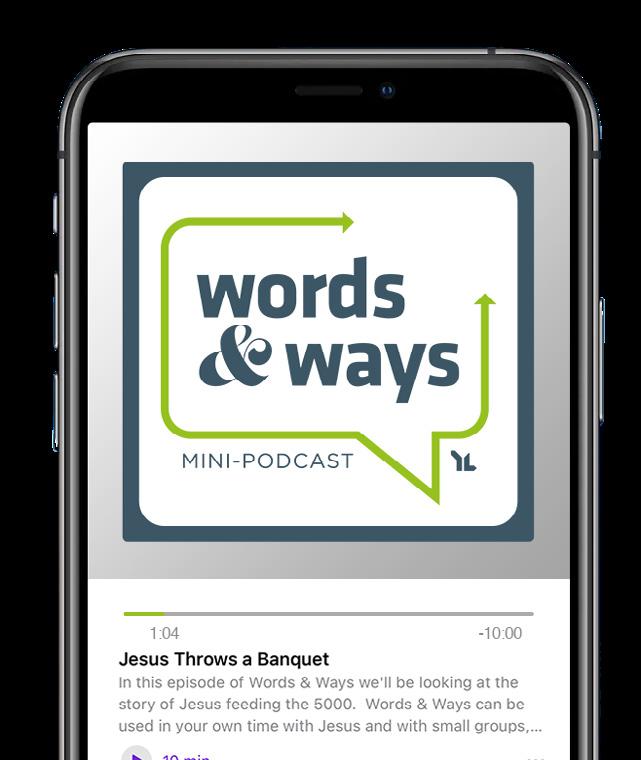

JESUS FOR YOU. 10 MINUTES WITH SEASONTWO LAUNCHES SEPTEMBER1

Available on all major podcast platforms.

On The Cover

Congratulations if you knew these two signs represent the letters “Y” and “L”! We hope you enjoy reading our story about the strong connections being made in and through Deaf Young Life.
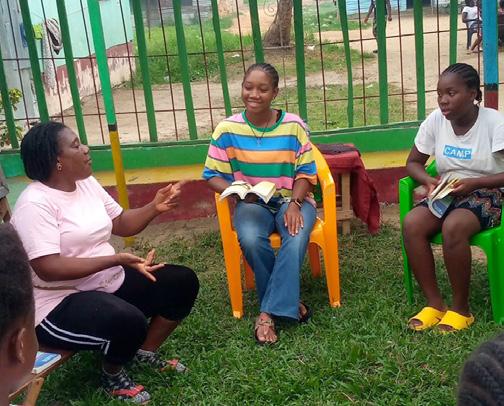


CONTENTS 05 10 12 18 IN THIS ISSUE If you’re receiving duplicate copies or would like to switch over to the electronic version, please contact the Young Life Mission Assistance team at assistance@sc.younglife.org. We can also help you with the change of address or giving information. Young Life is a Charter Member of the Evangelical Council for Financial Accountability. 04 From the President 05 Kids in Culture: Swipe Up 08 Global Dispatches: Snapshots From Around the World 10 A Fearless Voice 12 Being Deaf is Not a Disability 16 In Their Own Words: Unforgettable 18 Rising: Camping Post-COVID 22 The Last Word: Meeting Jesus Publisher/President Newt Crenshaw Executive Editors Lauren Bocci Gabe Knipp Senior Editor Jeff Chesemore Coordinator Michael Swyers Copy Editor Jessica Williams Art Director Isaac Watkins Designers Liz Knepper Kristen Ward Diné Wiedey
The Relationships Journal 3
FROM THE PRESIDENT

“Empower” is a tricky word. As it speaks to power moving from one person to another, it can signify status or worth, depending on whether you are doing the empowering or the one being empowered.
When it comes from God, however, we all need some empowering. We see in these pages that the gospel does exactly that. It empowers. Two-thousand years ago, the gospel empowered a group of ordinary men and women to share the news that Jesus had risen from the dead.
In Acts 4, as Peter and John went before the Sanhedrin, the ruling council and the wisest and most powerful men in Jerusalem were shocked at the courage these men had. They took note that these men had been with Jesus.
Jesus empowers those who spend time with Him. In these pages, you’ll see a young woman in Liberia who found her voice by being with Jesus. You’ll see how young people who are deaf do not see themselves as having a disability, but rather see language barriers. And breaking down language barriers is something the Spirit has done for millennia — to share the gospel and its power.
You’ll also see how, after a time of shutdown during the pandemic, our camping ministry is rebounding. It provides a solution to so much of what young people are looking for: Relationships. Adventure. Fun. And a chance to spend time with Jesus.
God’s Spirit seems to always work through a small group of people to bless and proclaim His work to a larger group. In the story of the early church God’s Spirit works through a small group of people to bless and proclaim His power to the whole world. In many ways, this edition of The Relationships Journal is born out of those early chapters in Acts, when Jesus charged the disciples to be witnesses. These same disciples saw the Spirit overcoming language barriers and empowering them to speak boldly for God.
As you read these pages, know: God’s movement in the early church is still happening today. It’s happening in the lives of young people around the world, from Liberia to Bulgaria to camps in the U.S. this summer. And you are a vital part of what God is doing. Your commitment and sacrifice for kids — through God’s empowerment — is continuing to change history.
Thank you. I hope through these stories you see how our Father uses all of our gifts to reveal His power on this earth.
Newt To see bonus content, scan this QR Code. 4 The Relationships Journal
Swipe Up
An In-Depth Look From Axis Ministries
WHAT’S THE TIKTOK MESS AND WHY DOES IT MATTER?
In 1968, Andy Warhol famously predicted a future where everyone would be world-famous for 15 minutes. What he couldn’t have predicted was that that fame would be decided by an algorithm-governed feed. Enter TikTok
Typically, the primary purpose of social media has been connecting with people we deliberately follow. But on TikTok, many users spend a majority of time watching and scrolling through algorithm-selected short-form videos on what TikTokers often call the FYP (For You Page). Exactly how this algorithm chooses videos to recommend is unclear. But the FYP is a major part of why TikTok consistently ranks highly in the App Store’s Entertainment category, as opposed to its Social Networking category; often TikTok is more like a TV that tries to read your mind than a way to simply connect with friends.
As you’ve probably heard, some in the U.S. regard TikTok and its Chinese-owned parent company, ByteDance, as a potential political threat. Some have wondered whether China might purposefully bias the algorithm to insert videos with a proChinese Communist Party (CCP) slant, or remove videos critical of the CCP, with a long-term goal of influencing our own nation’s political trajectory.
A more common concern, though, has to do with what might happen if the CCP ever ordered ByteDance to share
everything TikTok’s algorithm knew about a particular U.S. citizen. Many believe the personality profile of unsuspecting Americans would be up for dissection by an authoritarian government with possibly malicious intent.
Not everyone is convinced that these are legitimate issues, though, particularly Gen Zers. In an interview with the New York Times, 20-year-old TikTok user John Keon pointed out that, “American companies, specifically Apple and Google, are notorious for collecting massive amounts of data. So, if people are uncomfortable with that, they already have been comfortable with that without knowing. Privacy is really a thing of the past.” Another Gen Zer named Andrew Roth said, “[The proposed TikTok ban is] a bunch of really old people trying to distract the country from real dangers. We’re talking about banning TikTok when there’s kids getting gunned down in classrooms. That’s what matters.” 1
AN AVERAGE OF 95 MINUTES A DAY
Whether you agree or disagree with these critiques, there’s no denying that a TikTok ban would leave a massive hole in many Gen Zer’s daily routines. A study has found that Gen Z rated TikTok as the “most addictive” social media app. 2 The data bears this out: ByteDance now has over 1.05 billion monthly active users across 154 countries.3 TikTok users worldwide spend

KIDS IN CULTURE
The Relationships Journal 5
Gen Z rated TikTok as the ‘most addictive’ social media app.”
an average of 95 minutes a day on the app. 4 Not surprisingly, the largest proportion (25%) of U.S. TikTok users are between 10 to 19 years of age. 5
So, what are these 10- to 19-yearolds doing on TikTok? Well, as we said at the beginning, some are trying to game the algorithm and get famous, with some influencers reportedly earning upwards of $80,000 through brand partnerships and gifts. Others actually use TikTok to search for things like recipe recommendations, or how to do things like create a résumé. Many others simply hope to entertain themselves and keep up with what their friends care about.

TikTok is full of people being creative and funny, with memes, trends, skits, DIY videos, catchy music, new dances, beautiful people, makeup tutorials and new TikTok “challenges” all the time.
Unfortunately, the app isn’t all positivity. Many mental health experts
have become concerned that the real TikTok threat is not China’s data collection, but the harm it’s doing to teens’ emotional development.
It’s easy to run across mature and explicit content on TikTok, which can normalize lust and body-image issues. It’s also par for the course for users to encounter videos that promote or normalize self-harm.
Powerful video filters like “Bold Glamour” use artificial intelligence to remold users’ faces into something more aesthetically pleasing — and this kind of technology can have real mental health effects. As Renee Engeln, director of the Body and Media Lab at Northwestern University, put it in an interview with CNN, “Your own face that you see in the mirror suddenly looks ugly to you. It doesn’t look good enough. It looks like something you need to change. It makes you more interested in plastic surgery.” 6
6 The Relationships Journal
BEING HEARD, BEING LOVED
Thankfully, there are steps parents and other caring adults can take to mitigate some of these harmful effects:
1) Because the For You Page recommends content similar to what users have already engaged with, asking teens if you can watch their For You Page with them can be a great way to get a feel for the kinds of content they’re engaging with.
2) In March of 2023, TikTok also gave users the ability to “refresh” their For You feeds, effectively starting the algorithm over. Teens might use this function for a variety of reasons, but it could be a helpful tool if someone’s For You Page began consistently recommending harmful content. Users can also block videos with certain hashtags from appearing in their feeds.
3) TikTok has a feature called Family Pairing, which allows parents to remotely disable direct messaging, set screen time limits, enable content restrictions and mute TikTok notifications from their own TikTok account.
All these steps can make a positive difference, but the biggest differences are often made in conversation. As author David Augsburger has said, “Being heard is so close to being loved that for the average person, they are almost indistinguishable.”
Toward that end, here are some conversation starters we hope can facilitate some great connection with the teens in your world about this addictive, and controversial, app:

• What do you think about the idea of a TikTok ban?
• What’s your favorite thing about TikTok? What’s your least favorite thing?
• Why do you think the For You Page is so addictive?
• Do you know anyone who’s been negatively affected because of TikTok? What happened?
• Would you say TikTok has affected your mental health?
• What’s one recommendation you’d give to others about how to have a healthier, more positive experience on TikTok?
At Axis, we translate pop culture to help parents and caring adults understand and disciple their teenagers. For more help understanding your teens’ world, go to axis.org and sign up for our Culture Translator newsletter.
To see the sources of the footnotes mentioned here, scan this QR Code.
“BEING HEARD is so close to BEING LOVED that for the average person, they are almost indistinguishable.”
— David Augsburger
The Relationships Journal 7
Snapshots From Around the World
MADE POSSIBLE BY YOU.
Colombia (HOT) IN SOUTH AMERICA!
Last April a Hands-On Training (HOT) of universities took place in Bogotá, Colombia. Leaders from Peru, Argentina, Ecuador, Chile and Venezuela, as well as different cities in Colombia, were together sharing experiences, creating bonds of friendship and listening to the voice of God to go for the next young person in the universities.
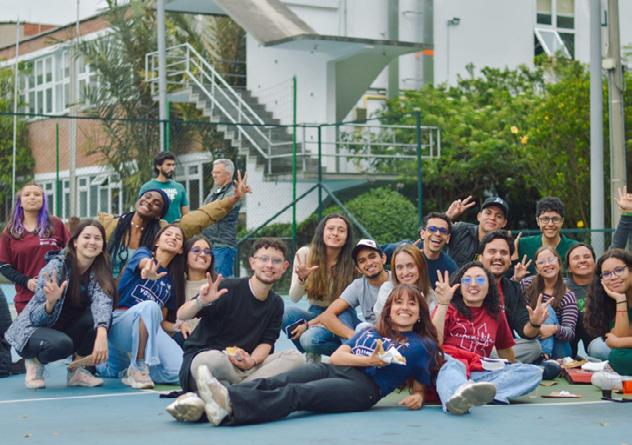
Mexico COURAGEOUS STEPS
Young Life in Mexico is celebrating 15 years of ministry this year! Alongside an exciting team of leaders, the mission has grown to reach 18 cities across the country, with even more cities — and kids — on the horizon. Leaning into this Spiritled movement, the Young Life Mexico team continues to take courageous steps toward mobilizing the “next community” reach the “next kid.” Help
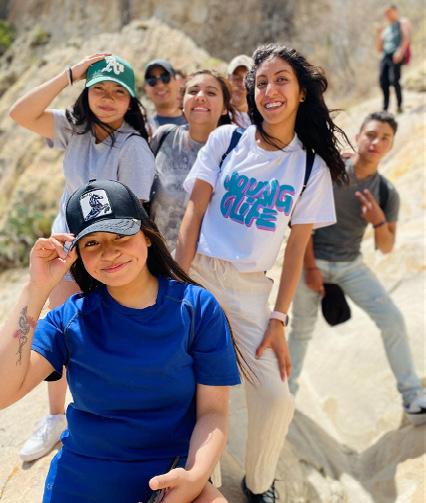
GLOBAL DISPATCHES
make more of these stories possible.
8 The Relationships Journal
Sweden
SWEET CONNECTIONS
In December, staff in Sweden started to give out ice cream at two of the schools in the area, and noticed kids wanted to stay and chat instead of just running away with their free treat! They are now able to build deeper connections with students at these schools.
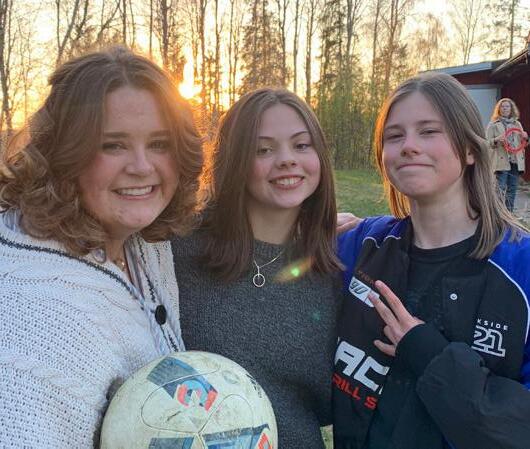
Rwanda LEADERS IN TRAINING
Young Life Nyamata in Rwanda recently hosted a group of 42 new leaders who came together for Young Life leader training. The day-long training comes after a four-week period of Hands-On Training, where they learned about Young Life through practice.
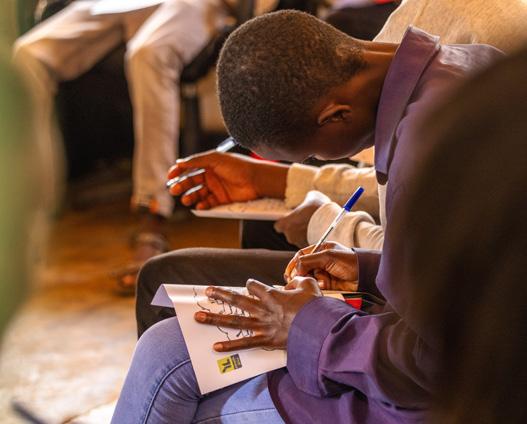
Vietnam DECISIONS
Young Life Vietnam’s newest area is growing rapidly. At their recent camp, 140 campers heard the gospel. In response, over 70 kids made the decision to follow Christ.

The Relationships Journal 9
By Yvonne P. Morlu, Regional Director of Western Liberia

VOICE FEARLESS
HOW THE GOSPEL EMPOWERS THE MOST VULNERABLE.
The Gospel of John tells the story of Jesus initiating a conversation with a woman who had many strikes against her in the Jewish culture of that day. For one, she was a woman, which made her a second-class citizen during that time. Secondly, she was a Samaritan, which to a Jew meant she was ceremonially unclean. Third, she had an unfavorable reputation, which caused her to quietly come to draw water from a well in the hottest part of the day. She was understandably guarded.
Not one of these supposed barriers, however, stopped Jesus from engaging with this vulnerable, hurting woman; in fact, she is why He came to Samaria. Jesus looked past all
10 The Relationships Journal
Derest, empowered behind the microphone.
the societal warnings to the person. His encounter with her changed the trajectory of her life, and many others’ lives who felt “less than” in that first-century culture.
FEELING DEFENSELESS
In our world today many girls are also left feeling vulnerable because of various factors: their culture and traditional backgrounds, ethnicity, educational levels and the inability to speak out because they lack self-confidence.
These girls, not wanting to appear weak, often spend their lives protecting themselves from feeling defenseless. Because of this, they refuse to take on leadership roles such as speaking out or advocating for others.
Vulnerability means taking a risk of being laughed at or bullied, but at the same time there’s also a chance for connection and growth. Opening up to someone is not always an easy thing to do. We think, “If they find out who we really are, they may reject us.”
LIVING ABOVE FEAR
I met Derest in 2018 when she came to her first club in Gardnersville, Liberia. She was so shy that she couldn’t look people in the eye to speak or ask questions about Young Life. At club, Derest always sat in the back.
The next year, Derest attended Young Life camp, where she had the opportunity to hear the life-giving message about the resurrection of Jesus.
With a newfound hope that she could live above her fears, she gave her life to Jesus there. She was inspired at camp when she saw a young girl her age speaking up front. The newborn Christian soon began attending a Bible-believing church.
In 2020 she became a Young Life volunteer leader and served as a housekeeping boss at camp. She also served as a cabin leader at one of the Campaigners camps.
A year later, Derest had the opportunity to speak at club for the very first time. She spoke on Luke 8:23-24, where Jesus calms the storms as well as the disciples’ fears. Can He do that for us as well? One could tell from her voice and facial expressions that God had broken the chain of vulnerability from her life.
Presently, Derest is a team leader directing the WyldLife club, and also the head of an advocacy group in her school.
GOD HAD BROKEN THE CHAIN OF VULNERABILITY FROM HER LIFE.
THE VOICE FOR THE VOICELESS
The Bible says, “For God gave us a spirit not of fear, but of power and love and selfcontrol” (2 Timothy 1:7), and “perfect love casts out fear” (1 John 4:18, ESV).
Jesus, through Young Life, has given Derest the opportunity to be heard and serve as a role model. This, in turn, has inspired many girls and boys to also let their voices be heard. This young woman is a powerful example that the best way to address cultural and traditional issues is to go to Jesus with all of our fears. He is the best voice for the voiceless.
Derest has found a kindred spirit, a forerunner even, in the woman at the well, who after meeting Jesus and realizing He alone can offer true life, saw her whole reality changed. Courageously returning to the townspeople who had little regard for her, she boldly shared about Him with her fellow Samaritans. They in turn discovered their own voices, proclaiming their belief in Him to others because, “we know that this man really is the Savior of the world.”
A world of women and men whom Jesus came to seek and set free.
Here she uses her voice to speak on behalf of students, both girls and boys, who also want their voices to be heard.
The Relationships Journal 11

12 The Relationships Journal
For years, being deaf was labeled a disability, but what if we started seeing it as a language barrier instead? This perspective is indeed changing in San Antonio, Texas, where the first solely deaf Young Life club since the ’90s is thriving.
Emma Faye Rudkin lost her hearing at age 3, and she questioned throughout her childhood if God could understand and love her. At 16 she went to Young Life camp with an understanding of Jesus, but no knowledge of Young Life. On the bus Morgan, her leader whom she’d just met that week, looked at her and said, “You’re going to start
communicating in American Sign Language (ASL). She walked up to them and began signing back.
After months of going to kids, Emma’s persistence meant Deaf Young Life was about to take off.
FACING DOWN EACH CHALLENGE
The foundation of Young Life work is going where kids are and building relationships on their turf. Yet, unless they have a friend involved, deaf teens don’t usually attend pep rallies or football games. Leaders must know where to find them or create opportunities where deaf kids feel comfortable.
because for the first time a loving adult who cares about them can sign their language — getting to know important details about their life and how they’re doing emotionally and spiritually.”
Young people who are deaf not only face communication challenges at home, but they are often excluded from social events. Many hearing parents have concerns with teaching their deaf teens to drive. So, each Thursday, Emma and her team pick kids up after school from all over San Antonio, to bring them to club. The leaders help them with their
HOW THE SPIRIT IS OVERCOMING LANGUAGE BARRIERS.
 Abbey Fagan
Abbey Fagan
Deaf Young Life here. I just know that about you.” Morgan planted a seed in Emma’s mind.
In 2015, three years after the bus conversation, Emma went on Young Life staff at 19, following God’s leading to start Deaf Young Life in San Antonio. For an entire semester, however, she showed up at kids’ events, but had little to show for it. Growing frustrated, Emma told her roommates she was going to quit. Maybe Morgan was wrong. Maybe Emma misunderstood God’s leading.
That night she mustered up enough hope to attend one final football game. As she was leaving, she saw a group of wrestlers
But once leaders find these teens, the connection is instant. When deafness excludes, it does so because there isn’t common language. Imagine being an English speaker dropped into a culture where no one knew your language.
This language barrier follows deaf teens wherever they go, even their own homes.1 Studies show that 90% of deaf kids are born into hearing homes. Of these homes more than 70% of parents do not sign with their children regularly, leaving the kids to learn the language at school. 2 Emma explains, “When a Young Life leader shows up and signs their language, it’s an instant connection and bond,
homework, eat dinner together and experience clubs and events made just for their needs — deemphasizing musical elements, while emphasizing the visual, and creating places for deaf teens to connect.
For example, most deaf teens do not attend the high school prom because of the music, not having a date or the fear of not being able to understand their date. But at Deaf Young Life Prom they show “Just Dance” up on the screen, so kids can learn how to dance through fun, visual videos. By using visuals and big drums to create a comfortable environment, Deaf Young Life restores a teenage milestone lost to them.
The Relationships Journal 13
The deaf community is estimated as the third largest unreached people group for the gospel in the world. 3 In fact, 98% of deaf people do not have a relationship with Jesus. 4 Again, the language barrier creates challenges. Deaf ministry is one of the most expensive ministries because it can require three to four different communication styles. “Each kid has a unique need and understanding of language, especially at camp where we provide all avenues of communication.”
In 2019, Emma was delighted to see the interpreters dressing up in costume and being a part of the program at Crooked Creek Ranch, one of Young Life’s camps in Colorado. No longer were the interpreters dressed all in black, standing out on stage. Now they blended in, which allowed the kids to know they’re truly a part of the camp experience. The ministry applies to service as well. For example, last summer Emma took

the first group of deaf teenagers since the ’90s to go serve as work crew at Young Life’s Trail West camp in Colorado.
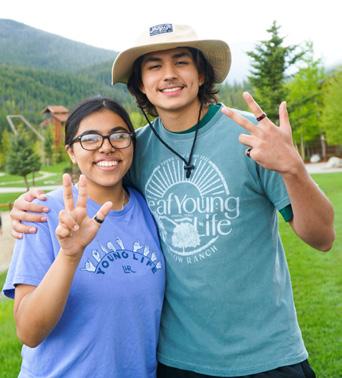
SMALL BUT GROWING
Deaf Young Life club in San Antonio is one of only 11 ministries solely for deaf teenagers across the entire United States. 5 They encompass Pentecost in Acts 2, men and women going out filled with the Holy Spirit, breaking down language barriers. Deaf teenagers can stand in awe: “We hear them declaring the wonders of God in our own tongues!” (Acts 2:11b).
God calls us to go to the outcasts and welcome them into His family — just like He did with us through Jesus. The Deaf Young Life leaders in San Antonio are doing this daily, praying to be the catalyst for change by showing up and signing the language of the deaf teens in their community, walking alongside them as they grow into adults running after God.
What began as a club with interpreter volunteer leaders four years ago has grown into a ministry where the graduates are ready to give back and tell their deaf community about Jesus.
Furthermore, a second deaf staff person was recently hired in Austin, Texas, to start Young Life at the Texas School of the Deaf, with future plans to continue into the central United States and expand from there.
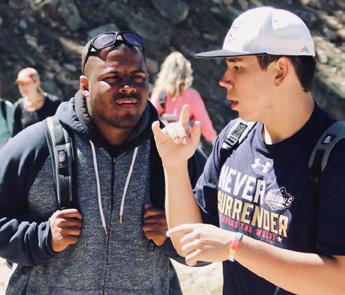
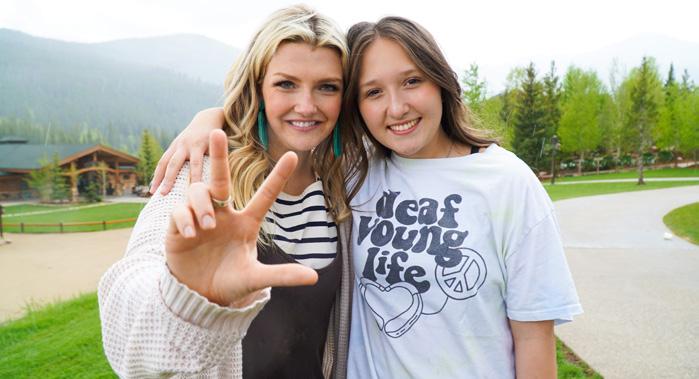
The seed planted on a bus ride home from camp has blossomed with no signs of stopping. We hope and pray this is just the beginning of God tearing down the language barriers through Young Life leaders, demonstrating the love of Jesus to these dear kids.
*Historically, Young Life has had ministries in various locations for deaf kids over the decades.
THREE QUESTIONS TO PONDER
1. How am I encompassing Acts 2 in my own life?
Pentecost isn’t just a historical event. It is how we should live out our lives. As Christians, we get to bridge the gaps for the outcasts. God will enable us.
2. What’s stopping me from pursuing people on the outskirts?
God commissions us to break down barriers whether language, culture, socio-economic, etc.
Don’t let your fear stop you from showing up. Pray, seek out and ask questions.
3. How can I get connected with the deaf community?
Find a local interpreter at a church or local community ASL class who can help you learn and grow. Once you learn the alphabet in ASL, kids will love to teach you from there! They’re desperate to communicate with adults who care about them.
14 The Relationships Journal
Like my second family now
Students often bullied Edwin for being deaf at his school in California, to the point that he contemplated ending his own life. Later he moved to Texas and things were brighter, but still incredibly lonely.
Edwin met Emma at the clinic as he was getting new hearing aids. At Young Life club, Emma introduced Edwin to David, the Young Life leader. “These people I met welcomed me with open arms. They are like my second family now.”
David offered to teach Edwin how to drive, and now they hang out every week.
Before going to camp, Edwin was mad at God for allowing him to become deaf, but after camp he realized God wasn’t the problem; instead, he now sees that God has good plans for his life.

1. Centers for Disease Control and Prevention (CDC). Identifying infants with hearing loss – United States, 1999-2007.
2. Sullivan, Vernon, & Scanlan, 1987
3. The International Mission Board – Global Research, April 2016, www.peoplegroups.org.
4. Deaf Missions: Published in Missions Frontiers Magazine
5. Sonshine Interpreters Study, 2021
The Relationships Journal 15
Unforgettable
By Joana, age 15 from Burgas, Bulgaria

I’m not usually the kind of person who fills her summer with camp participation, but I decided to give it a try. I made one of the best decisions ever! Young Life camp gave my summer a sense of fulfillment. In my eyes, for a camp to have its own fullness, it needs to meet three important criteria: to be entertaining, provide good teaching and create opportunities for building relationships.
wave of positive emotion; the games started even as we were coming in the parking lot. The beginning was totally exciting, but we didn’t expect how much more was in store for us! Every single day was different, and the surprises followed quickly, one after the other. Together under the stars or gathered in a meeting hall, dancing and playing, we made new memories. Our leaders and organizers invested a lot of effort to set this all up. But even more impressive was how they joined in the fun alongside us.
A major event of personal importance during camp was my own birthday. I can definitely say this was one of the most memorable, special days in my life — I was able to spend it in an amazing location, with amazing people, in a special and beautiful way!
GOOD TEACHING
The themes and stories during this camp were really well presented, both for those who have faith and those who are still uncertain of their personal faith journey. I saw the impact of those teachings on one girl from our town. To her, faith in Jesus was something new and unfamiliar, but during the last evening of the camp she shared that she felt much closer to God and now had a better understanding of His love. She made a commitment to start reading the Bible after returning home.
We also heard the personal life stories of four camp volunteers. Many of us recognized ourselves in their stories, and realized we were not alone in this complicated and tough world.
ENTERTAINING
The resort of Pamporovo, and specifically the hotel of Forrest Nook provided wonderful conditions and warm hospitality. From the beginning, we were engulfed in a
A major part of the spiritual impact of camp was a period of 20 minutes — at first, we didn’t think much about it, but later many of us realized this time was of key importance. At the end of the last evening, we were instructed to walk out of the hotel, and spend 20 minutes by ourselves, without talking to anyone else: simply spending time with God. And so, each of us chose a place under the stars and stood there silently. The only sound was the crickets. What everyone spoke personally to God, we cannot know. But when we came back, some were in tears, while others had wide smiles on their faces.
IN THEIR OWN WORDS
16 The Relationships Journal
Joana
RELATIONSHIPS
Not only had we made friendships with young people from Bulgaria and North Macedonia, but we also felt the love of all the volunteers and camp leaders. Their joy and positive attitude inspired us to cherish this warmth in our hearts and bring it home.
Our deep fellowship during those five days was also due to the fact that we didn’t use our phones or any technology. Yes, it was kind of hard, but only for the first half hour. Afterwards, we quickly forgot about our small screens. We simply didn’t need them — and some of us didn’t even want them back (including me). This experience reminded us that we shouldn’t be dependent on technology, especially our phones. If it wasn’t for their absence, we wouldn’t have experienced those five days in such an exciting way.
I’m grateful for the opportunity to share about those unforgettable five days. I thank everyone who made Young Life camp possible. And most of all, I’m thankful to God for the opportunity to be a part of it!
As you read this, summer camps are wrapping up in the U.S., and thousands of kids experienced a week similar to Joana’s because of the generosity of friends like you. To see what many of our friends will be interacting with in their new walk with the Savior, check out Young Life’s After-Camp Plan on the Bible App!
Check out Young Life’s After-Camp Plan on the Bible app.
✥ Inspiring worship and prayer
✥ Teaching from Young Life staff and Catholic clergy on how to engage today’s teenagers and how Catholic and Protestant adults can work together to reach youth with the gospel message
To learn more, scan here.

THE CONFERENCE INCLUDES:
us October 5-7 University of
2023 YOUNG LIFE CATHOLIC SUMMIT Join
Notre Dame
The Relationships Journal 17
“We quickly forgot about our small screens. We simply didn’t need them.”
Gabe Knipp, senior director of Content and Buzz, recently sat down with Chad Sievert, senior vice president of Camping for Young Life, to discuss the state of camping in 2023.

Gabe: You’re the senior vice president of Young Life Camping. What is it about camping for you personally that gets you out of bed every day?
Chad: Well, I was one of those kids who went to camp and had a leader who invested in me. I went to Castaway as a WyldLife kid and Frontier Ranch in high school. And then I went to Wilderness for adventure camping. I had the full camp experience.
I love teeing leaders up to have an experience with kids. I just love the community around camping, and what that community creates. I love the tactical business part of camping; that our camp staff are committed to what they do in and for the mission.
One of our camps has coined this phrase, “Welcome home. You’re here. What can I do for you?”

I think what happens at camp is magical, and honestly, what it creates for when leaders and kids get home. It’s the starting point of being a new creation. Why wouldn’t I want to pour more into this opportunity?
Gabe: COVID happened in March of 2020. How did that affect camping?
Chad: From a missional perspective, 2020 was the first time since a polio outbreak in the 1950s, that Young Life missed a summer of camping. The summer of 2020 impacted not only that summer season but the ministry rhythm of the mission for the last three years. Those gaps range from school season camping to summer, our volunteer pipeline, and our ability to grow ministry in the local area.
Gabe: How much do you think that disruption will cause some permanent changes to things?
Chad: We’re building up resilience again. There are some changes I think we’ll have to continue to evaluate; something as simple as, “Are we going to provide linens?” Do we have
18 The Relationships Journal
WHY KIDS NEED YOUNG LIFE CAMPING, NOW MORE THAN EVER.
the manpower to support providing linens? When you think about our work crew in the laundry, they spend six camp days turning over the previous week’s linens. Is that a value we still want to hold?
The gaps we’re experiencing in our ministry operations right now are helping to highlight what’s central and where we can be more

flexible. In this season, we’ve been forced to try different approaches to WHAT and HOW we serve guests, while still accomplishing Young Life’s big WHY for camping – it’s a strategy for setting up local volunteer leaders to walk alongside their friends as they personally experience and process the gospel.



Gabe: What changes are you seeing with kids themselves?
Chad: When kids arrive at camp, there’s a different level of what they’re bringing there. Some aren’t as comfortable as they were pre-COVID being in a large setting, and navigating social dynamics is different. They’re carrying things into camp that over the course of COVID, they had to carry alone. We’ve seen a higher volume of kids navigating the challenges of being an adolescent right now than we did preCOVID. And their ability to engage, navigate, and maybe have a little grit or resilience along the way, is depleted at the moment.
Gabe: With the baggage kids are carrying, why is it important for them to get away to camp?
Chad: After living through a couple of years of isolation, remote learning, and virtual community – what Young Life has to offer kids and their circumstances today is more widely applicable and needed than ever! While Young Life is not in the business of being therapists, what we do is therapeutic! Through the faithful pursuant work of volunteer leaders to show up in the lives of kids in their local community, they

The Relationships Journal 19
experience being seen, known, and loved –which lays the groundwork for movement toward healing and wholeness to occur.
Our camps are designed to facilitate and support the ministering presence of leaders in the lives of kids. Camp is a place for leaders and their friends to step away from the everyday rhythms, demands, and distractions of home to spend intentional time sharing life together.

Yet, that’s not the whole story. Young Life’s mission is not focused on simply developing healthy relationships in adolescents, which is so evidently needed today. But from this foundation, we introduce them to the one relationship we’re all created to belong in and experience together, with Jesus. Our camps give Jesus’ invitation the central spotlight. Our volunteers and staff wrap
around leaders and their friends with our best efforts to prepare the way and offer a reflection of life in the Kingdom. Camp is the body of Christ in action – incarnating His seeing, knowing, and loving presence in the lives of kids. They’re surrounded by it! And their leader has the sacred privilege of walking with them, helping them process Jesus’ invitation, and continuing to reflect the heart of God for them and with them when they return home. This is why Young Life camps!
Gabe: What’s encouraged you during the past few years?
Chad: The courage and resiliency of our mission. Camp staff have continued to faithfully create these special environments even in the midst of difficult circumstances. And our field staff have continued to pursue
100,000 80,000 60,000 40,000 20,000 0 2018 2019 2020 2021 2022 2023
Summer Camp Year 20 The Relationships Journal
SUMMER CAMPERS AND LEADERS AT U.S. CAMPS
kids for the sake of the gospel.
Our capital giving towards new projects, rebuilding, constructing a brand-new camp, adding a ride, and so many other projects. I’m so encouraged our donors have actually accelerated their giving in this season. We’re doing more capital construction than ever. At the start of COVID, I thought, “Oh my gosh, we’re going to have to slow down some of these projects in the queue.” And the funding just kept coming. And to think about this moment in time where our attendance numbers have dipped because of COVID, but our preparation for what’s to come has only been accelerating, is so encouraging.
It’s overwhelming to think donors have stayed faithful to what happens at camp. And the fact that they’re giving towards supporting more or improving more, is amazing.
BRINGING CAMP HOME
How to apply what happens at camp to reduce stress and care for teens.
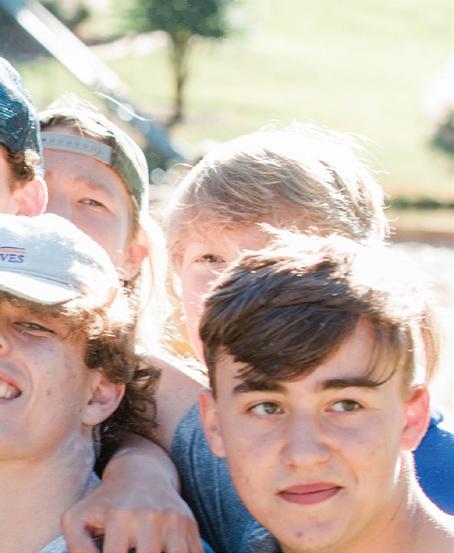

Camp experiences seem to be a positive factor in the mental health of young people — kids enjoy meals together, get outside and experience adventure — all of which have been proven to help young people thrive. With anxiety, loneliness and depression spiking for younger generations, what can camp teach us about creating environments of health? You may not be able to build a ropes course, and please — no waterslides into kiddie pools — but you can take steps today to make an impact.
1. Share meals. At camp, every meal together is around the table. These times are meant to facilitate conversation and make sure no one feels left out. At home, shared mealtime has been shown to be a protective factor in adolescents’ mental health. Mealtime is a chance to talk and connect without an agenda, and talking is another key aspect in caring for kids’ mental health.
2. Move. Aerobic activity reduces anxiety and depression. Health benefits range from better sleep to less anxiety to better cognitive function! At camp, kids are on the move. After all, God gave us physical bodies; we aren’t just minds meant to think things (though it may sometimes feel like that). Extending that to home, even taking a walk can improve a young person’s mood. How can you get outside and move together?
3. Laugh and play. Built into every Young Life camp is humor. It’s good to laugh. Whether playing a board game or watching a favorite funny movie, laughter and play release endorphins — which increase the feeling of well-being. Research shows that play helps release young people from the impact of stress.
To make camp possible for more kids, scan here.
4. Model it. Most studies on parental modeling and mental health focus on the negative. A few, however, are increasingly focused on the positive — how parents, role models and mentors are crucial for adolescents. Just as Young Life leaders at camp show kids what life can look like — and become mentors and role models — kids need more adults who show up in that way. If you model health, it’s more likely to be picked up by kids, who are watching even when they don’t seem like it!
The need for parents to do everything can be overwhelming today. Instead of trying to replicate camp at home, or with a young person, what is one thing you can do? Maybe it’s a meal together once a week or a chance to watch a fun movie. By doing even one thing, you’ll be making a difference.
IT’S LIKE THEY’RE BRINGING HEAVEN TO EARTH.”
— a sixth-grader, returning home after a week at WyldLife camp
The Relationships Journal 21
Meeting Jesus
Jeff Chesemore
Perhaps you’ve noticed our tagline on the journal cover: Kids. Culture. Jesus.
In this case we certainly start with the end in mind. Jesus is our raison d’etre — the sole purpose for everything we do. Young Life exists, as our mission statement proclaims, to introduce adolescents to Jesus Christ and help them grow in their faith.
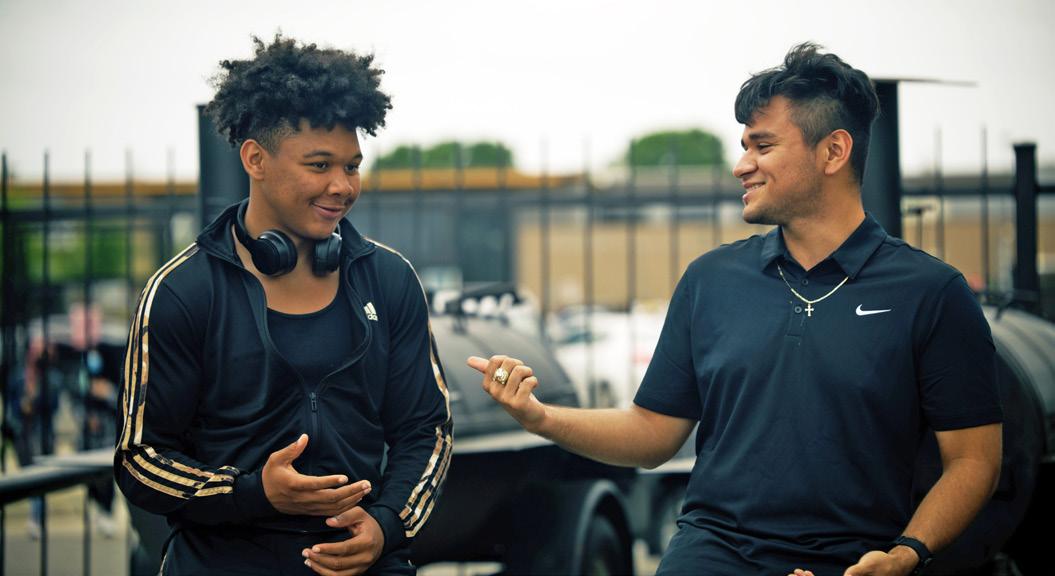
This introduction is an invitation to follow the One who created us in His image, who knows us better than we know ourselves, who loves us and wants to be with us.
For far too many, however, this is not the Jesus they’ve encountered. For some, the mention of Jesus conjures up images of rules or restrictions. For others, Jesus just seems irrelevant.
Longtime Young Life staff Chuck Reinhold often said, “People don’t have a problem with Jesus Christ — they have a problem with their introduction to Jesus Christ —
because a wrong introduction leads to a wrong conclusion every time.”
And when embracing a wrong conclusion, it’s no surprise they ask, “Why should I follow Him?” (Meaning, “What’s in it for me?”)
Jesus is not the means to an end. He is the end. Why follow Him? Because He’s the only one worthy of our lives …
He is God’s eternal Son and was with the Father before time began. He “became flesh and blood and moved into the neighborhood” (John 1:14, The Message).
He took upon Himself our sins and sorrows.
He voluntarily laid down His life because He would rather die than live without us.
He rose again three days later, demonstrating His power and authority over death.
He abides in our hearts through the Holy Spirit.
This is the Jesus we’re introducing to kids! The cry of every heart is to know Him and the freedom He provides.
Jesus asked over 300 questions in the Bible. Perhaps the most critical one is this: “Who do you say I am?”
There is no more important question in life. Our answer to this determines everything! If we conclude He is in fact the King of kings and the Lord of lords, we’ll long to be in relationship with Him, enjoying the eternal life that begins right here, right now.
This is the good news we have the privilege of sharing with kids every day, all around the world.
• What was your introduction to Jesus like?
• Does it square with the Jesus of the Gospels?
• Do you long to know Him more?
THE LAST WORD
22 The Relationships Journal

MILITARY TEENS AND FAMILIES NEED YOU NOW SERVE THOSE WHO SERVE US 1. PRAY Join our Marching Forward Prayer Team which receives email requests and meets monthly via Zoom. 2. SERVE Join us on work staff this summer at one of our military family camps in the U.S. or our military teen camp in Scotland. 3. INVEST Our goal is to expand ministries on U.S. military installations worldwide. Find out more and join our team using the QR Code below. GET INVOLVED! Get involved today. Scan QR Code and find out more. info@military.younglife.org

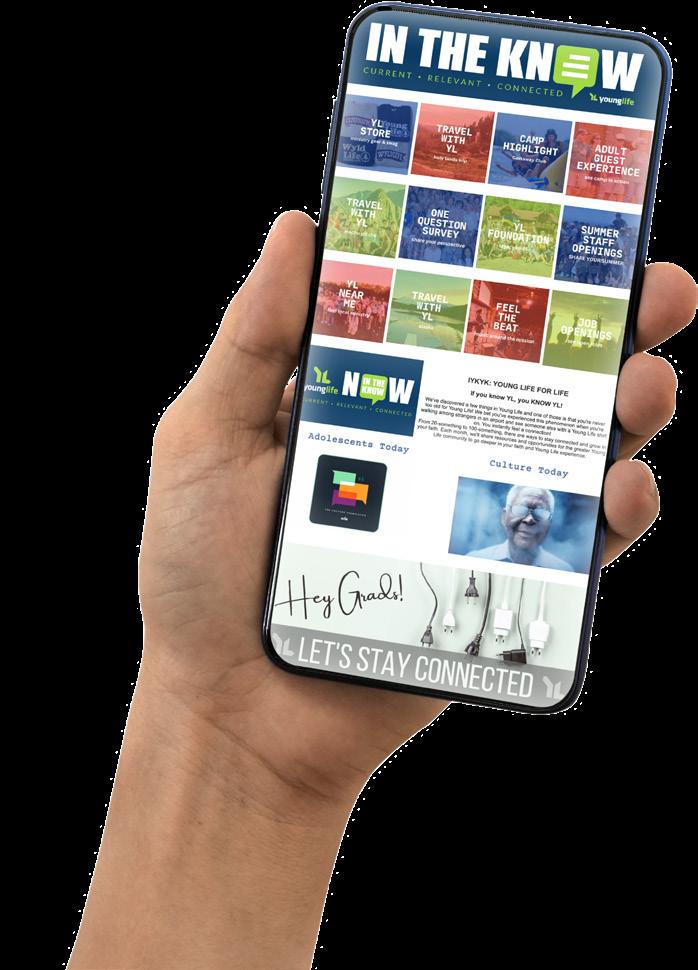
P.O. Box 520 Colorado Springs, CO 80901 ADDRESS SERVICE REQUESTED NONPROFIT ORG US POSTAGE PAID Young Life MAKE SURE YOU STAY “IN THE KNOW!” A monthly email publication designed specifically for alumni and friends of the Young Life mission. Stay engaged with kids, Christ and culture via stimulating stories, videos and articles. Real-time resources and opportunities in the palm of your hand! Scan the QR Code below or email us at alumni@sc.younglife.org to subscribe.






















 Abbey Fagan
Abbey Fagan




















